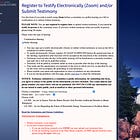Get your testimony ready! The bill submitted by Senator Chip Curry has been scheduled for a public hearing on January 23rd at 1:00 in the Cross Building, room 211. The bill is short:
Be it enacted by the People of the State of Maine as follows:
Sec. 1. 35-A MRSA §3210-I, sub-§5 is enacted to read:
5. Use of eminent domain prohibited. Eminent domain may not be used in the development or construction of a generation connection line or transmission line under the program.
SUMMARY
This bill prohibits the use of eminent domain in the development or construction of a generation connection line or transmission line under the Northern Maine Renewable Energy Development Program.
While the bill looks to be a way to save private landowners from losing property to eminent domain for the Northern Renewable Energy Development Program, it will be very difficult, if not impossible, to pass a bill that takes eminent domain off the table entirely. In fact, it would create a conflict with other Maine statutes and could be completely defeated, leaving us with no better eminent domain laws than we currently have.
Maine’s eminent domain laws are some of the weakest in the country, and put property owners at an extreme disadvantage. There were other bills that were submitted that could have changed Maine laws to better protect property owners, but the Legislative Council failed to move any of those bills forward. So this is the only eminent domain bill we have for this legislative session.
I’m not a political strategist in any way, but here are some ideas you may want to include.
Write your testimony to support the bill, but include suggestions for amendments so that the language doesn’t say that eminent domain is prohibited, but instead would change the eminent domain law to grant more rights to landowners. There are examples in Minnesota’s “Buy the Farm” statute. You can read more about that in the document below. The basic idea is that if a utility takes a portion of a property, the property owner can choose to force the utility to buy the entirety of the property at it’s best value, and this can include relocation costs.
Another example was proposed in Iowa which would require a utility to secure 75% of the easement needed before they could invoke eminent domain, AND all easements needed to be secured within 2 years or they reverted back to the original owner.
Include what your land means to you and your family, and how the threat of eminent domain impacted (or would impact) you.
Keep in mind that the committee hears the bill that is presented to them. They haven’t voted yet on the matter, so chastising them for other actions (like voting for or against a different bill) isn’t appropriate (even if you really, really want to).
Providing your testimony in person is ideal, but written testimony can also be provided. If you’re not familiar with the process you can follow the steps I wrote in this article -
Getting involved in the legislative process may seem intimidating, but it’s a great way for your voice to be heard. Many of these hearings are attended only by lobbyists and those who benefit financially from proposed legislation. Often, these are the only voices the legislators hear when they consider a bill. We need to speak out before the vote happens. Calling and writing to your legislator is one step, but addressing the committee hearing a bill gets your concerns before the group of legislators who will be deciding how the bill moves forward. See you in Augusta!





